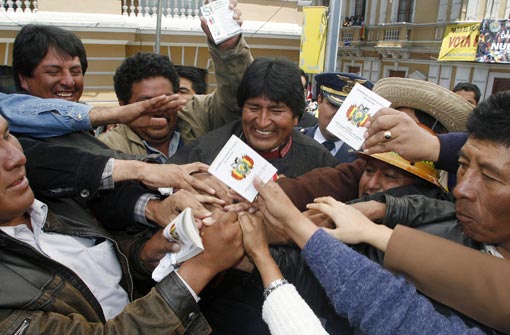Interview with with Álvaro García Linera, vice-president of Bolivia, by Maristella Svampa, Pablo Stefanoni and Ricardo Bajo, from August 2009 Bolivian edition of Le
Bolivia


Bolivians celebrate their new constitution. President Evo Morales in centre.
The following article by Raúl Prada Alcoreza was originally published in the first issue (June 2008) of Crítica y Emancipación, a biannual Latin American journal of the social sciences. This translation from the Spanish, by Shana Yael Shubs and Ruth Felder, was published this year in a complete English-language version of the journal’s first issue. It was distributed at the recent congress of the Latin American Studies Association, held in Rio de Janeiro, Brazil, in June. A review of the first issue of Crítica y Emancipación was published at http://tinyurl.com/nuk4jp. This article also appeared at Bolivia Rising.

By Federico Fuentes
June 1, 2009 -- Addressing the 400-strong May 21 workshop with workers from the industrial heartland of Guayana, dedicated to the “socialist transformation of basic industry”, Venezuelan President Hugo Chavez noted with satisfaction the outcomes of discussions: “I can see, sense and feel the roar of the working class.”
“When the working class roars, the capitalists tremble”, he said.
Chavez announced plans to implement a series of radical measures, largely drawn from proposals coming from the workers’ discussion that day. The workers greeted each of Chavez’s announcements with roars of approval, chanting “This is how you govern!”
Chavez said: “The proposals made have emerged from the depths of the working class. I did not come here to tell you what to do! It is you who are proposing this.”
Nationalisation and workers’ control
Review by John Riddell
La Vía Campesina: Globalization and the Power of Peasants by Annette Aurélie Desmarais. Fernwood Publishing, 2007.
May 31, 2009 -- The neoliberal assault that has driven labour into retreat over the last two decades has also sparked the emergence of a peasants’ international, La Vía Campesina. Based in 56 countries across five continents, this alliance has mounted a sustained and spirited defence of peasant cultivation, community and control of food production.
Annette Desmarais’s book on La Vía Campesina has given us a probing and perceptive account of the world peasant movement’s origins, outlook and activities. (”La Vía Campesina” means “Peasant Path” or “Peasant Way”. See “Peasants or Farmers?” at the end of this article.)
Interview with Bolivia’s foreign minister David Choquehuanca by Patricia Bravo and Cris González, translated from the original article in the March 20, 2009, edition of

Submission by Republic of Bolivia to the Ad Hoc Working Group on Long-term Cooperative Action under the [UN Framework Convention on Climate Change] (AWG-LCA)
April 25, 2009 -- We call on developed countries to commit to deep emission reductions in order to advance the objective of avoiding dangerous anthropogenic interference with the climate system and its consequences, to reflect their historical responsibility for the causes of climate change, and to respect the principles of equity and common but differentiated responsibilities in accordance with the UN Framework Convention on Climate Change (UNFCCC).

Translated by Federico Fuentes
Cumaná, April 17, 2009
The heads of state and governments of Bolivia, Cuba, Dominica, Honduras, Nicaragua and Venezuela -- member countries of the Bolivarian Alternative for the Peoples of Our Americas (ALBA) -- consider that the proposed Declaration of the 5th Summit of the Americas is insufficient and unacceptable for the following reasons:
During his intervention at the seventh ALBA Summit, Bolivia's president Evo Morales recalled the 1962 documents of the Organisation of American States (OAS) that resulted in Cuba being expelled from the organisation, and outlined the importance of reflecting on the motives of that expulsion.

Banner supporting a `yes' vote in the January 25, 2009, constitutional referendum.
By Federico Fuentes
April 1, 2009 -- The historic enactment of Bolivia’s new constitution that grants unprecedented rights to the country’s indigenous majority, approved by over 61% of the vote on January 25, represented the beginning of “communitarian socialism”, according to President Evo Morales.
This was not the first time Bolivia’s first indigenous president had raised the concept of “communitarian socialism”. In his April 2008 speech to the United Nations, Morales spoke of the need for “a communitarian socialism in harmony with Mother Earth”.
While Morales’s political party is officially known as Movement Towards Socialism–Political Instrument for the Sovereignty of the Peoples (MAS-IPSP), it was originally simply IPSP. Blocked from registering itself as an electoral party, the IPSP took up the offer of the then-existing MAS party to use its registered name to run in elections.
By Hervé Do Alto, translated for Links International Journal of Socialist Renewal by Gonzalo Villanueva with Do Alto’s permission.
By Marc Becker
February 5, 2009 -- After an absence of four years, the World Social Forum (WSF) returned to Brazil during the last week of January 2009. More than 100,000 people descended on the city of Belem at the mouth of the mighty Amazon River to debate proposals and plan strategies for making a new and better world.
The forum first met in the southern Brazilian city of Porto Alegre in 2001 as a gathering of social movements dedicated to fighting neoliberalism and militarism. Nine years later, Latin America has shifted significantly to the left, and the forum has played an important role in that process.
The forum began on January 27, 2009, as all of the forums have, with a massive march through the streets of Belem. The theme of the march was from Africa, where the last unified forum was held in Nairobi, Kenya, in
2007, to the Amazon. A drenching tropical rain momentarily stalled the planned events. The march concluded with a massive rally featuring speeches and music.
